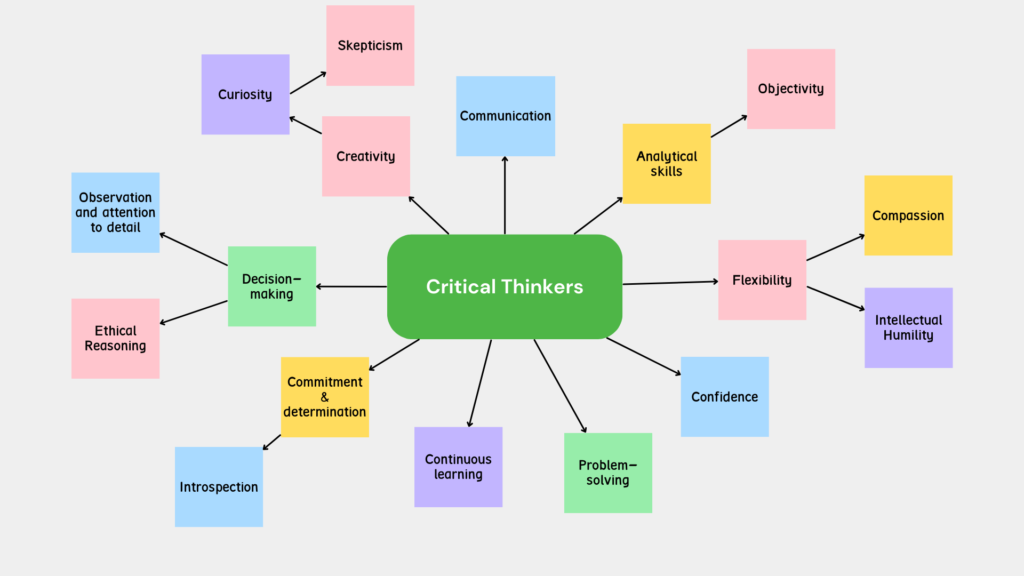Developing critical thinking skills is essential in personal and professional dealings. Critical thinking helps individuals navigate challenges, solve problems, and communicate effectively, leading to better outcomes in various aspects of their life. Today you’ll discover the key characteristics of critical thinkers and how you can develop and hone your critical thinking skills for personal and professional success.
What Is Critical Thinking?
Critical thinking is a cognitive process that involves your ability to analyze, evaluate, and synthesize information to make reasoned judgments and decisions. It encompasses various skills, including logical reasoning, problem-solving, and reflection.
The best critical thinkers are masters at using knowledge to think rationally, independently, and with a healthy dose of skepticism. They can dissect complex issues and identify the most viable solutions relatively quickly.
In a way, critical thinking is about asking questions.
It can help you avoid common pitfalls that hinder success—for example, jumping to conclusions, relying on incomplete or biased information, and making decisions based on emotions rather than facts.
Ultimately, critical thinking leads to more effective decision-making and tackling challenges with confidence and clarity.
Key Characteristics of Critical Thinkers
Critical thinking requires the use of various cognitive and non-cognitive skills. Here are the main characteristics of critical thinkers to help improve your thinking abilities.
1. Curiosity
Curiosity is the innate desire to learn, explore, and discover new things. It drives individuals to ask questions, seek answers, and continuously expand their knowledge and understanding.
Think about the leaders you admire most, and you’ll likely find they are eager to learn and seek answers to questions that arise in their minds. This inquisitive mindset helps them explore various aspects of a topic, resulting in deeper understanding and well-rounded knowledge.
To build your curiosity, cultivate your desire to learn. Embrace the idea that you don’t know everything and be open to learning from different viewpoints. Doing so will challenge your assumptions or preconceived notions, leading to better decision-making and problem-solving.
2. Introspection
Introspection is examining and reflecting on your thoughts, feelings, actions, and motivations. It’s an essential characteristic of critical thinkers, enabling them to understand their biases, strengths, and weaknesses — and learn from experiences.
To cultivate this characteristic, regularly take the time to reflect on your thoughts, emotions, and actions. Analyzing these aspects of yourself allows you to identify patterns and tendencies affecting your decision-making and overall thought process.
You should also acknowledge your own biases and work on overcoming each one. Recognize the areas where you need growth and develop a plan for self-improvement.
3. Analytical skills
The analytical process involves evaluating the validity of information and arguments. It’s about breaking down complex information or situations into their core components and forming conclusions.
This key characteristic of critical thinkers is important. With strong analytical skills, you can better examine information from different perspectives, identify logical inconsistencies, and separate facts from opinions.
4. Objectivity
Objectivity is assessing situations and information without allowing personal biases, emotions, or opinions to influence judgment. It is a crucial characteristic of critical thinkers, as it helps them make well-informed decisions based on facts and evidence.
Cultivate this characteristic by making a conscious effort to separate your biases from the decision-making process. That will ensure you base your judgments on factual information rather than personal preferences or beliefs.
As a result, emotions, opinions, or unsupported claims won’t sway you easily. Form the habit of relying on objective, verifiable information and data.
5. Compassion
Critical thinkers balance empathy with objectivity. In other words, they are sensitive to the emotional aspects of the suffering others endure while remaining objective.
Being compassionate and empathetic can lead to more effective solutions because you’ll have a deeper understanding of complex issues. Compassionate leaders can appreciate the feelings, needs, and experiences of others while making decisions.
6. Creativity
Creativity is another crucial trait of critical thinking you can cultivate. It helps people approach problem-solving in innovative ways and challenge established norms and ideas. Developing your creativity can help you uncover unique solutions and perspectives others may have overlooked.
Ask yourself this simple question to remember to apply your creativity in every situation: Is there a better way to do it?
Embracing your creativity involves questioning the status quo, entertaining seemingly impossible ideas, and being open to experimentation and change.
7. Communication
Another vital characteristic of critical thinkers is communication, which involves effectively articulating ideas and solutions in ways others can understand and appreciate.
Good communication skills can help you clearly present your thoughts and findings, whether verbally or written. In addition, it improves your ability to persuade others using logical reasoning.
The most successful communicators are active listeners, going beyond hearing words and paying attention to the feedback and non-verbal cues of others. This is crucial in fostering understanding and collaboration.
8. Decision-making
Decision-making is about selecting the most effective solution or action in any situation, particularly complex ones where no clear answer is apparent — or multiple solutions seem equally relevant.
Critical thinkers are adept at weighing the pros and cons of various options and making informed decisions that consider time, efficiency, and effectiveness.
Make a resolve to make decisions even in the face of fear to improve your decision-making abilities.
9. Inference and deductions
Inference is your interpretation of a situation beyond the literal information given. Deduction refers to your understanding based on the evidence. They are both essential aspects of drawing conclusions based on information.
Critical thinkers can understand situations beyond face value and make connections between different pieces of information. They excel at examining evidence and making informed judgments while avoiding assumptions that can lead to incorrect conclusions.
10. Continuous learning
Continuous learning is essential, be it in business or personal affairs. The most successful leaders commit to their personal growth and improvement. They continuously learn from their experiences (successes and failures) while actively seeking feedback and reflecting on each action.
So commit to always looking for ways to expand your knowledge and skills. Recognize that there’s always room for growth and development. This can no doubt improve your ability to think critically.
11. Confidence
Confidence is about trusting one’s own abilities and reasoning skills. Critical thinkers are confident individuals, conveying ideas to others with self-assurance while remaining open to new information and seeking help when necessary.
This balance between self-assurance and humility allows critical thinkers to grow and improve continually.
You can grow confidence by knowing your strengths and addressing development needs. The more you improve your abilities, the more confident you’ll be when handling situations and communicating with others.
12. Flexibility
The best leaders are flexible, able to adapt to new information, and change relatively quickly. They are willing to alter their approach or opinion when presented with compelling evidence or a better solution. In short, they understand reversibility is about being flexible.
Improving your flexibility in problem-solving can help you tackle various issues more effectively. You’ll be more open to trying more things, learning from your mistakes, and moving toward a successful outcome.
13. Observation and attention to detail
These traits are about noticing things and being attentive. Cultivating keen alertness will help you identify patterns, spot inconsistencies, and gather important information when analyzing situations and finding solutions.
So learn to notice even the smallest details and be attentive in your analysis. With these traits alone, you can take your understanding of things to an ultra level.
14. Commitment and determination
Those with commitment and determination demonstrate perseverance despite obstacles and setbacks while focusing on finding the truth or the most effective solution. This unwavering dedication allows them to tackle complex issues and see their endeavors through to completion, even when faced with seemingly insurmountable challenges.
Train yourself to stay committed and determined by refusing to give up, but do it sensibly. For example, don’t run a failing business you can’t turn around. Building your ability to stay committed and determined will help you overcome barriers and achieve your goals.
15. Intellectual Humility
Intellectual humility is about recognizing and accepting the limits of one’s knowledge and understanding and being willing to learn from others.
Acknowledging that nobody knows everything, critical thinkers with intellectual humility are open to new information, ideas, and perspectives. They are comfortable admitting when they are wrong or do not have all the answers, which allows them to grow and develop their thinking skills.
Intellectual humility promotes a collaborative atmosphere, fostering healthy debates and discussions in both personal and professional settings. This trait also helps combat the dangerous effects of overconfidence or arrogance, which can lead to flawed decision-making and missed growth opportunities.
To cultivate intellectual humility, you can practice active listening, engage with diverse sources of information, and continually challenge your beliefs and assumptions.
16. Skepticism
Skepticism is a key characteristic of critical thinkers, as it entails questioning the validity of statements, assumptions, and conclusions to ensure they are well-founded and logical.
Skeptical people approach information with a discerning mindset, carefully examining the credibility of sources, the quality of evidence, and the soundness of reasoning before accepting any claim or argument.
This trait protects critical thinkers from falling prey to misinformation, unfounded beliefs, or faulty reasoning, as they are less likely to accept ideas without proper scrutiny. Skepticism also encourages a healthy level of doubt, fostering an environment where ideas are continually challenged, debated, and refined.
To develop skepticism, it’s essential to adopt a questioning attitude. Ask questions like what is the evidence for this claim? Are there alternative explanations we should consider?
It’s also important to be aware of cognitive biases and logical fallacies. These can undermine the validity of arguments and lead to incorrect conclusions.
17. Ethical Reasoning
Ethical reasoning means applying moral and ethical principles to one’s critical thinking processes. This ensures a strong sense of integrity and responsibility guides decisions and actions.
Critical thinkers who apply this skill are concerned with determining the most logical or efficient solution while also considering their choices’ moral implications and consequences. They can evaluate options based on ethical frameworks, such as consequentialism, deontology, or virtue ethics.
To develop ethical reasoning: cultivate a solid moral compass, engage in ongoing moral and ethical reflection, and educate yourself about various ethical theories and principles.
Engaging in discussions with others about moral and ethical issues can also help to refine your understanding and promote empathy and open-mindedness.
Developing your critical thinking skills

You need to actively cultivate the various characteristics of critical thinkers to develop your critical thinking skills. Some effective strategies include the following.
- Engage in active learning
- Ask open-ended questions
- Seek diverse perspectives on various topics
- Practice self-reflection
- Challenge assumptions
- Develop problem-solving techniques
Incorporating these strategies into daily life can gradually strengthen your critical thinking abilities.
The Role of Education, Training, and Practice
- Education: Formal, informal, and self-education can introduce you to critical thinking concepts and provide a foundation for developing your skills.
- Training: Various training programs and workshops can help you further enhance your abilities by providing targeted instruction, practical exercises, and feedback.
- Practice: You can reinforce learning, gain valuable experience, and gradually improve your abilities by consistently applying critical thinking strategies in different situations.
Combining education, training, and practice is a great way to quickly develop and strengthen your critical thinking skills.
The Relationship Between Critical Thinking and Rationality
By now, you know that critical thinking is a broader cognitive skill that requires various skills, such as problem-solving, logical reasoning, creativity, and effective communication.
On the other hand, rationality is a much narrower concept. Being rational is about analyzing, evaluating, and clarifying one’s thinking with the intention of improving reasoning accuracy. It focuses on applying reason and logic to arrive at conclusions consistent with available evidence and sound principles.
For example, looking at a situation as if you’re an outsider is a method of rational thinking. Rationality is about maximizing objectivity and minimizing cognitive biases. Critical thinking encompasses rationality and goes beyond it.
The More Critical Thinkers, The Better
Studying the characteristics of critical thinkers and developing your abilities can profoundly impact personal and professional success. As a critical thinker, you can more easily make informed decisions, solve difficult problems, and navigate challenging situations.
Further, cultivating and encouraging the development of critical thinking characteristics among individuals is essential for society. A culture that values curiosity, introspection, objectivity, and the other characteristics of critical thinkers, helps create a more informed, empathetic, and resilient society.

We empower people to succeed through information and essential services. Do you need help with something? Contact Us.
Want a heads-up once a week whenever a new article drops?



